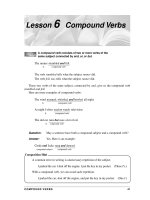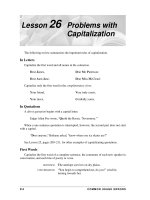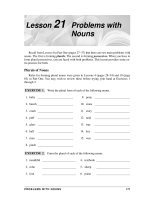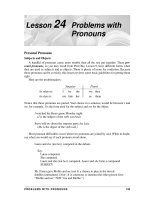Grammar And Usage For Better Writing - Problems with Pronouns
Bạn đang xem bản rút gọn của tài liệu. Xem và tải ngay bản đầy đủ của tài liệu tại đây (53.62 KB, 21 trang )
Personal Pronouns
Subjects and Objects
A handful of pronouns cause more trouble than all the rest put together. These per-
sonal pronouns, as you may recall from Part One, Lesson 9, have different forms when
they are used as subjects and as objects. There is plenty of room for confusion. Because
these pronouns can be so tricky, this lesson reviews some basic guidelines for getting them
right.
Here are the troublemakers:
Singular Plural
As subjects: I he she we they
As objects: me him her us them
Notice that these pronouns are paired. Your choice in a sentence would be between I and
me, for example. I is the form used for the subject and me for the object.
I watched the Bears game Monday night.
(I is the subject of the verb watched.)
Steve told me about the surprise party for Luis.
(Me is the object of the verb told.)
Most pronoun difficulties occur when two pronouns are joined by and. When in doubt,
say what you would say if each pronoun stood alone.
Laura and she (not her) competed in the debate.
Say:
Laura competed.
She competed.
Laura and she (not her) competed. Laura and she form a compound
SUBJECT.
Mr. Foster gave Mollie and me (not I) a chance to play in the mixed-
doubles tournament. (Note: It is courteous to mention the other person first:
“Mollie and me,” NOT “me and Mollie.”)
PROBLEMS WITH PRONOUNS 193
Lesson
24
Problems with
Pronouns
Say:
Mr. Foster gave Mollie.
Mr. Foster gave me.
Mr. Foster gave Mollie and me (not I). Mollie and me form a
compound indirect OBJECT.
Go with Maura and him (not he) to the flea market.
Say:
Go with Maura.
Go with him.
Go with Maura and him (not he). Maura and him form a compound
OBJECT of the preposition with.
Note the following correct form:
The apples were divided between Tom and me.
In this case, Tom and me are OBJECTS of the preposition between.
In the following examples of pronoun difficulties, don’t be fooled by the words swim-
mers and students. They do not affect which pronouns to use.
We (not Us) swimmers are competing in the county championships.
Mr. Gonzales took us (not we) students on a tour of the new regional high
school.
In the first sentence, we is a SUBJECT of the verb are competing. In the second sentence,
us is an OBJECT of the verb took.
Watch out for sentences that leave out a verb because it is understood.
Dita is already as tall as he (not him).
He is the SUBJECT of the understood verb is. Think of the sentence as reading, “Dita is
already as tall as he is tall.”
EXERCISE 1.
In each sentence, underline the correct form of the pronoun (used as a
subject) in parentheses.
1. (We, Us) students are late for class.
2. Maria and (her, she) are fond of swimming.
3. When I’m dancing, nobody else can be as happy as (I, me).
4. Todd and (I, me) went to the Lakers-Celtics game.
5. Sharon, Mike, and (he, him) are studying together.
194 COMMON USAGE ERRORS
EXERCISE 2.
In each sentence, underline the correct form of the pronoun (used as
an object) in parentheses.
1. Mike bought shakes for him and (I, me).
2. Janna saw Greg and (them, they) on the bus.
3. The coach awarded letters to all of (us, we) members of the team.
4. We found our cat Max and (she, her) asleep on the couch.
5. Play with Sean and (I, me) in the band concert.
EXERCISE 3.
In each sentence, underline the correct form of the pronoun (either
subject or object) in parentheses.
1. (Her, She) and her tennis partner will travel to Cleveland for the match.
2. Mom prepared a hot dinner for Dad and (I, me).
3. (Us, We) students are entering our sweet potato casserole in the cooking contest.
4. Devon caught sight of Lam and (them, they) on the bus to Lockport.
5. (Them, They) are applying for American citizenship as soon as possible.
6. My faithful dog and (I, me) climbed Mt. Washington together.
7. When it comes to precalculus, Don is as quick as (her, she).
8. Mr. Ortiz brought Nathan and (her, she) some homemade fudge.
9. The treasurer asked all of (us, we) club members to pay our back dues.
10. Joanna and (them, they) made all the sandwiches for her sister’s bridal shower.
11. At the end of the recycling drive, the chairperson of the committee thanked (us, we)
workers for our help.
12. Aaron and (I, me) played a strong doubles match but lost in a tiebreaker.
13. Ellen is planning a picnic for Danny and (I, me).
14. At the end of the school year, Sasha, Annie, and (he, him) were commended for aca-
demic achievement.
15. (Us, We) members of the National Honor Society had a special assembly.
16. Li and (he, him) are in the same Spanish class.
PROBLEMS WITH PRONOUNS 195
17. (Them, They) are the best strawberries I’ve ever tasted.
18. Our pen pal in Bosnia wrote a long letter to Karin and (I, me).
19. We saw Marisol and (he, him) in the stands at the baseball game.
20. (Him and I, He and I) went on a rafting trip on the Nantahala River.
Agreement of a Pronoun with Its Antecedent
In Part One, Lesson 9, we learned that a pronoun must agree with its antecedent in num-
ber. (The word antecedent comes from two Latin words meaning “going before.” An an-
tecedent is the noun that the pronoun stands for.)
Look at the following sentence:
m
iiii
i
ii
x
A wolf is gentle with its young.
Its refers to wolf. Wolf is the antecedent of its. Wolf is singular. Therefore, its is singular.
(Notice that the antecedent “goes before” the pronoun.)
Now look at this sentence:
m
iiiiiiiiii
x
Wolves are gentle with their young.
Their refers to wolves. Wolves is the antecedent of their. Wolves is plural. Therefore, their
is plural.
EXERCISE 4.
In each sentence below, write a pronoun that agrees with its
antecedent.
1. A girl leaving the store stumbled and dropped _____ ice cream cone.
2. Marilyn has a new dress but has not worn _____ yet.
3. Michael knows that _____ will make the team.
4. Janine likes cats, but Ariel dislikes _____.
5. The building will have _____ roof repaired.
Indefinite Pronouns
Many problems of agreement arise with the words on the following list. They are
called indefinite pronouns. A personal pronoun that has one of these words as an an-
tecedent must be singular.
anybody either neither one
anyone everybody nobody somebody
each everyone no one someone
196 COMMON USAGE ERRORS
Note the following correct forms.
m
iiiiiiiiiiii
x
Each of the girls must bring her track shoes.
Each is singular. Her is singular.
m
hiiiiiiiiiij
r
x
hii
x
Everybody must report to his or her adviser.
Everybody is singular. His . . . her with or is singular. Even though everybody “sounds”
plural, it isn’t. The use of their with everybody—or with any other word on the list—is in-
correct in formal English.
With either . . . or or neither . . . nor, use the nearer antecedent when choosing a
pronoun.
m
iiiiiii
x
Either Jill or Claire will bring her records to the dance.
Jill . . . Claire is a compound subject. Since Jill is singular and Claire is also singular, the
singular her is used.
m
iiii
x
Neither Norm nor his cousins buy their groceries here.
Norm is singular, but cousins is plural. Therefore, the plural their is used to agree with the
nearer antecedent, cousins.
EXERCISE 5.
In each sentence below, underline the correct form of the possessive
pronoun in parentheses.
1. Someone on the girls’ field hockey team forgot (her, their) hockey stick.
2. No one on the swimming team gave (his or her, their) approval to the practice
schedule.
3. An elephant forms a close bond with (its, their) trainer.
4. Neither Dario nor Justin had (his, their) purple hair for very long.
5. Everybody brought (their, his or her) own golf clubs.
Still another error is using a plural verb with one of the indefinite pronouns. Note these
correct forms.
m
iiiiiiiiii
x
Everyone at the meeting has a stake in the decision.
Everyone is singular. Has is singular.
PROBLEMS WITH PRONOUNS 197
m
iiiiiiiii
x
Each of the members was asked to vote.
Each is singular. Was is singular.
m
iii
x
Neither the twins nor she wants to go to the beach this summer.
Twins is plural, but she is singular. The singular verb, wants, agrees with the nearer sub-
ject, she, which is also singular.
Some indefinite pronouns usually require a plural verb: several, many, both, some, few.
m
iii
x
Some were not invited to Yolanda’s party.
m
iiiiiiii
x
Many of the apples are still green.
m
iiiiiiiiii
x
Several in the stands cheer whenever Forenzo comes to bat.
EXERCISE 6.
Underline the correct form of the verb in parentheses.
1. Either Paul or she (are, is) running in Saturday’s marathon.
2. Nobody in the class (are, is) satisfied with the test grades.
3. A few of the audience (is, are) leaving before the end of the play.
4. One of the rear tires (have, has) gone flat.
5. Both of the Baker boys (were, was) late to school because the bus broke down.
6. Neither Kim nor his two sisters (is, are) above the age of fifteen.
Possessive Pronouns
As we discovered in Lesson 9 of Part One, pronouns can cause problems in yet another
area—possessives. You have already worked with noun possessives. With nouns, you used
apostrophes to show possession.
The possessives of personal pronouns, however, have NO apostrophes. Note the fol-
lowing correct forms.
Is this yours or hers?
Those books are theirs, not ours.
Where is its collar?
198 COMMON USAGE ERRORS
Look carefully at the last sentence—it will help you avoid a common mistake. You
have seen the word it’s, with an apostrophe. It’s is a contraction of it is. Whenever you
wonder whether its needs an apostrophe, simply replace its with it is. If the sentence does
make sense, use an apostrophe. If it doesn’t make sense (as in “Where is it is collar?),
don’t use the apostrophe.
The possessives of indefinite pronouns, unlike personal pronouns, DO use apostrophes.
Somebody’s bookbag is on the kitchen table.
Everyone’s job is nobody’s job.
No one’s opinion is more valued than Rebecca’s.
EXERCISE 7.
In each sentence, underline the correct possessive pronoun form in
parentheses.
1. The idea for improving the lunchroom is (theirs, their’s).
2. The Joneses own the Honda; (ours, our’s) is the Ford.
3. (Its, It’s) starting to rain—cover the chairs.
4. Ms. Maloney is (everybodys, everybody’s) favorite history teacher.
5. The book of Emily Dickinson’s poems is (hers, her’s).
6. Is this (someone’s, someones) physics textbook?
7. The puppy limps because it injured (its, it’s) paw.
8. The accident was (nobodys, nobody’s) fault.
9. The Gerhardts spent Thanksgiving with friends of (theirs, their’s).
10. (Its, It’s) time to turn the light off and go to sleep.
EXERCISE 8.
In each sentence, underline the correct pronoun form in parentheses.
1. (We, Us) students are willing to volunteer our time in the community.
2. Jayne says that book is (hers, her’s).
3. Go with John and (I, me) to the movies.
4. One of the girls (were, was) dismissed from the chorus.
5. Neither of the boys (plays, play) ice hockey.
PROBLEMS WITH PRONOUNS 199
6. (They, Them) are the teachers from our school.
7. Everyone on the girls’ soccer team had (her, their) name read aloud at the awards
ceremony.
8. Few students taking the test brought (his or her, their) own pencils.
9. Between you and (I, me), I thought the acting was bad.
10. Pedro and (I, me) liked John Grisham’s latest novel.
EXERCISE 9.
Fill in the blanks with the correct pronoun.
1. Alicia was in an accident. She broke _____ leg.
2. You ordered this CD and paid for it. Take it. It is _____.
3. Jon and I are neighbors. _____ lives next door to me.
4. Linda and Safiya are our friends. We like _____ very much.
5. The ball came right to you, but your bat could not connect with _____.
6. Meredith gave Matt the book. _____ had bought it especially for _____.
7. One of the boys played in every game of the tournament. _____ was exhausted.
8. The coach and the team prepared for the game. _____ still lost.
9. Did you know the last answer? _____ was easy, wasn’t it?
10. My older sister made the last payment on her car. Now it belongs to _____.
200 COMMON USAGE ERRORS









